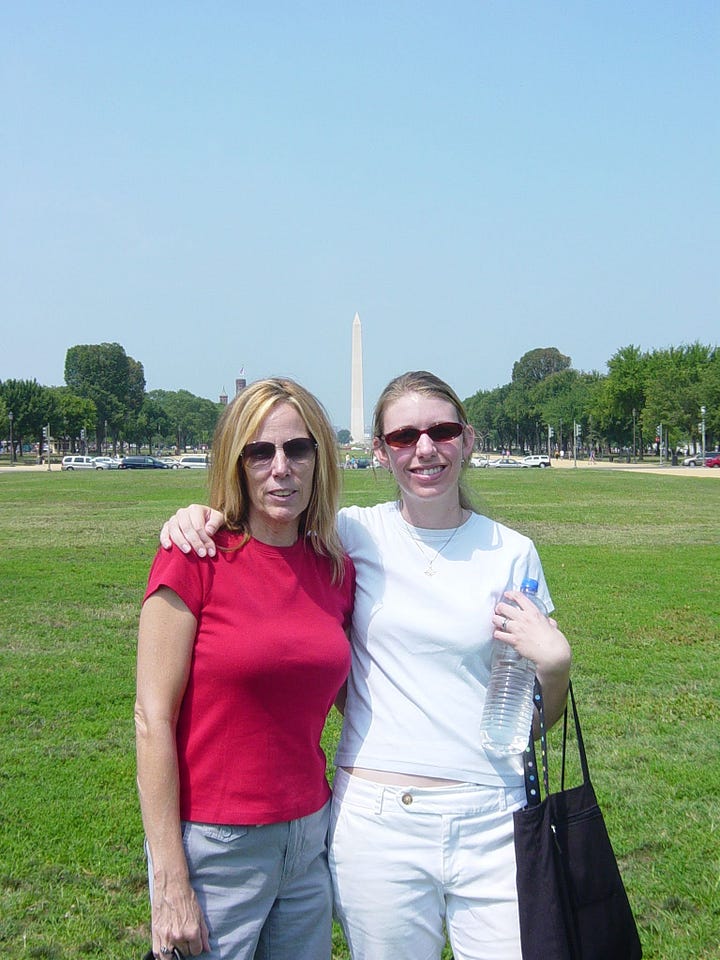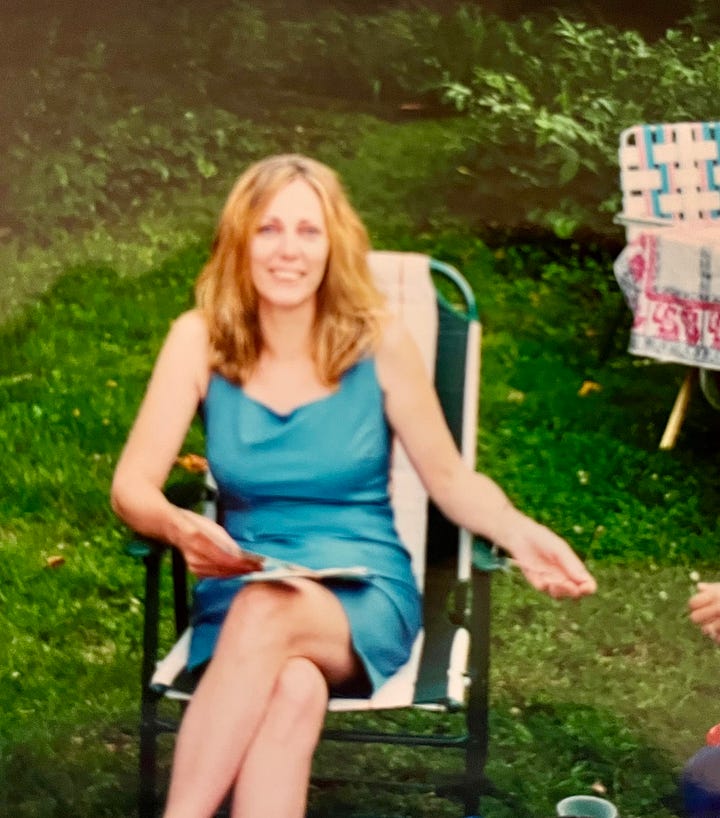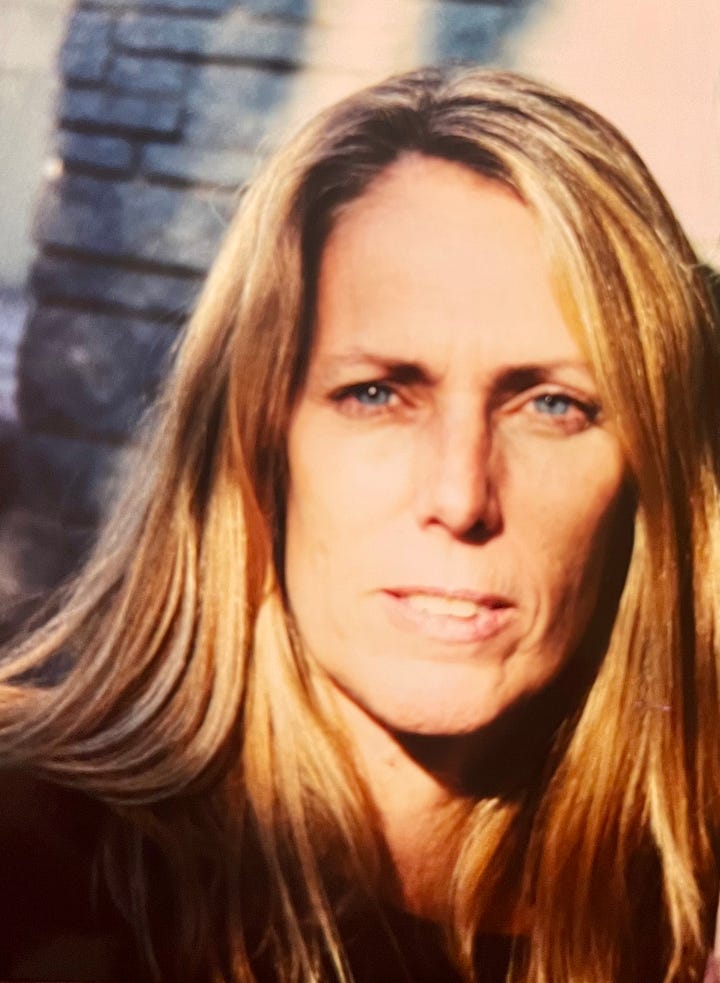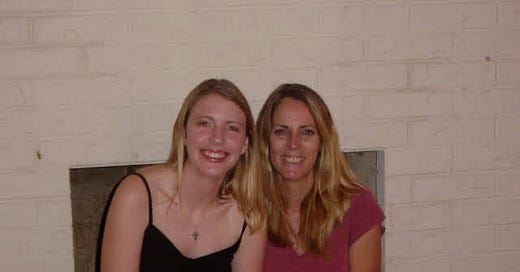When I met Jana, we had almost nothing in common other than our enrollment in the same grad program. I was a 22-year-old conservative evangelical with very little life experience and even fewer clues. She was a 43-year-old divorced, rather bohemian single mom to whom life had not always been kind.
But she was kind, always. There wasn’t a mean bone in her body.
There was a child-like quality to Jana that belied her deep-seated grit. She was as resilient as she was vulnerable. She had at least as much joy as she had had pain. She was melancholy and enthusiastic. She was sultry and innocent. You could see it all swirl on the surface of her enormous, pale blue eyes, like storm clouds rolling across a sunny sky. You could see it when she danced with a glass in her hand and when she drove with the windows down and when she sauntered across campus in faded jeans and aviator sunglasses looking like some kind of rock-star-next-door.
She could be wise. And so naive. She believed the best about people, sometimes for far too long. She gave some people way too many chances to hurt her. She was so beautiful, inside and out, I never could understand why anyone would ever want to. Maybe they didn’t mean to. Maybe they just got drunk on her generosity.
For one thing, Jana’s transparency and trust made her easy to judge. As self-righteous as I was when I met her, I judged her liberally. Her and everyone else.
But when I found myself tangled and trapped in my own choices, I called Jana. Every time. Any time. Because I knew she would never judge. No matter what you gave her to work with.
She had two kids, an ailing mother, a high-strung dog, and a never-ending supply of complications and chaos. Her house was usually a disaster, piled high with laundry and full ashtrays and overdue bills. She was almost always a few days late and many dollars short.
At that simpler, more sanctimonious stage in my life, she was the type of person I quietly peered at down the bridge of my nose, with my tidy house and checked-off to-do lists and ordered, upstanding life. And with my sheer panic when pictures were knocked askew and trains went off the rails.
I’ve learned with age that it’s often the people with messy rooms who have room for messes. And that’s what I ended up bringing into Jana’s life. A bigger mess than anything I knew how to clean up. I hadn’t been equipped for messes like that. I had been prepared for spilled porcelain teacups you could gently blot with delicate, laced napkins embroidered with Bible verses. Not things that required a shop vac. If not a backhoe.
Jana wasn’t daunted. There wasn’t anything I couldn’t tell her. I became an open book we read together, lounging on her couch amid pizza boxes and wine bottles, the air heavy with her cigarette smoke and my salty tears. She helped me piece together the next few chapters. They were better than anything I could have written without her. Better than anything that came before.
For a time, she was like oxygen for me on days I gasped for breath. She was the parachute on my back as I flailed through the air. And when my life reconstituted, she was a shower of champagne, effervescent with happiness for me. She wanted to hear every detail.
“Cool!” she would say with a teenager’s giggle.
But I didn’t need her as much. We didn’t talk as much.
I accidentally put her 19-year-old daughter in a room full of naked men. Caitlin was studying theatre and had an internship in DC. She stayed with me and Kevin for the summer, and I took her to some plays. We went to one about a baseball team, set in a (very authentic) locker room. I’m not sure how many, if any, penises Caitlin had seen up to that point, but I’m pretty sure she drastically increased her count in one fell swoop. As did I, actually.
I told Jana I had exposed Caitlin to roughly twenty penises, give or take a few, and we laughed heartily over the immense, ridiculous irony of Little Miss Evangelical sullying her child in this way. In the time she had known me, my influence had gone from Jesus to G-strings (well, not even that).
That was a long time ago, and as the years piled up, I fear I failed her completely. On balance, I took more than I gave. Poor health and distance isolated her. She couldn’t reach out to me, and I didn’t try very hard to find her.
The balance of mutuality between us tipped again, and I kept the fulcrum at center. She had never done that to me. When I was weighed down, she pushed it toward me, with all her might.
But I let her down. Slowly and gently. I floated away.
I would look back occasionally, tell myself to give her a call. Nudge the fulcrum towards her just a bit. It wasn’t that heavy. It would require so little effort.
But then something more pressing and more stimulating and more distracting would come into view, and I would go on with the happy life she had helped me to find.
We had a zoom call with our group of friends a few years ago. When Jana came on the screen, I caught my breath. She looked pale and frail, almost translucent. Her beautiful hair had thinned and dulled. She had an oxygen tube under her nose.
But she was the same goofy girl of a woman I had always known. She enthused about the wildlife outside her window and the stream that ran near her house. She laughed at our jokes and beamed at our good news.
“Cool!” she said, with her familiar, youthful giggle.
In May, I texted her to wish her happy birthday.
“71 years old! Yeehaw!!!” she wrote back.
Rest in peace, beautiful soul. Thank you for everything, which is so damn much.








Damn Ms. Berkeley Fletcher. Every time I read your articles I am so moved, inspired or, as with this one, embarrassed by my own behavior (or lack thereof). I think I’ll call my brother with whom I’ve not spoken for over 20 years for stupid reasons and total laziness. As usual, thank you for your inspiration.
That was beautiful. I think that many of us who have been lucky (through "dumb" luck), have had a Jana in our lives. But ALL of us have been you. Thanks for being so transparent. This piece reminds me of the Episcopal confession that includes asking forgiveness for "things undone."
"Most merciful God,
we confess that we have sinned against you
in thought, word, and deed,
by what we have done,
and by what we have left undone."
We are in this with you. That's why it resonates so deeply.